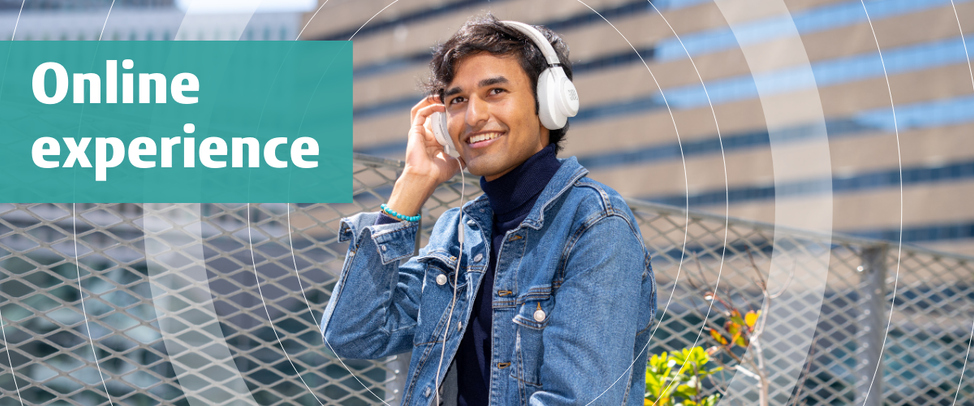
Study information | Online Experience
Online Experience Leiden University College The Hague
- Date
- Thursday 30 January 2025
- Time
- Explanation
- This online experience day will be hosted on Zoom. We recommend joining on a desktop for the best viewing experience.
- Address
- This event will take place on Zoom. We recommend joining on a desktop.
- Room
- Zoom
Please note: This online event is fully booked
Therefore, it is unfortunately no longer possible to sign up. The next experience days will take place on Friday, 14 February (on campus) or Thursday, 20 February (online).
What to expect?
This online experience day includes an information session about our programme, a sample lecture and a virtual Q&A session with a panel made up of students and staff members. Additionally we will offer a virtual campus tour so you get a feel for our unique campus building.
Some programme components, such as the information session, will be recorded and made available afterwards, but we recommend joining in realtime if possible. It's the best way to ensure you don't miss anything that is not recorded, and to interact with our panel of staff and students who are excited to tell you more about LUC.
Programme
Please note that we are still finalizing the programme, but we expect the programme to look roughly as follows:
| 13:15 - 14:15 | Introduction and plenary sample class |
| 14:15 - 15:15 |
Sample class of your choice You can use this for your reflection |
| 15:15 - 16:00 | Q&A session |
| 16:00 - 16:30 | Virtual campus tour |
Please note all times are in CET / Amsterdam time zone.
Introduction & Plenary
We kick this session off with a quick introduction to LUC, followed by a plenary class. All attendees will join this class, and your parents are welcome to sit in on it as well. However, you can not use this plenary class as inspiration for your LUC reflection as part of your application.
In this plenary class, provided by Dr. Kai Hebel, the focus will be on the tantalizing question: what will kill us? Join us and find out!
Sample classes
After the general plenary class, you will join a sample class. You can find the descriptions of the classes below, to help you select the class of your choice. These are the classes on offer, in random order:
Through recent real-world examples, we’ll uncover how seemingly straightforward data can be misleading and how understanding some key concepts of statistical reasoning is crucial for making informed decisions about complex social problems. We will discuss some concrete tips that will help you recognize when data may be deceiving and how to interpret it correctly. The best part - no prior knowledge of statistics is necessary.
Political systems are notorious for being 'sticky' - that is, they don't change very easily. But sometimes they do. In this sample lecture, David will invite you to start thinking about the conditions for stability and change, both in your own life and in the society you live in.
The recent IPPC reports tell us – again – that climate change is one of the most pressing issues of our time and will affect modern human life globally. Locally extreme climate events such as droughts and storms already pose serious challenges to society – also here in the Netherlands. In this class we will discuss the pros and cons of several adaptation strategies to reduce extreme weather risks, such as geoengineering and nature-based solutions.
Investigative Journalism is dedicated to uncovering wrongdoing and abuses of power, exposing hidden trends, and explaining poorly understood patterns in society. Acting independently of academia, business, politics, and law enforcement, investigative journalists play a crucial role in fostering a culture of accountability. With democracy and transparency under constant threat, the need to understand this field has never been greater. This sample lesson will include a mini-case study of a recent investigative report that had a significant impact in Dutch society.
Robert Chesal lectures in Journalism at LUC, Leiden University and the University of Groningen. He has been a journalist for over 30 years and currently works for the foreign news desk of NOS, the biggest news provider in the Dutch public broadcasting system.
Land plays a central role in a considerable part of human activity, serving many individual and collective purposes. We need land for key activities such as subsistence, housing, and economic production, and we are in constant competition for land. With such a central role in people's lives, and being a finite resource, disputes over land are often a key element of the world's most complex global challenges. In this class we will learn basic concepts about land rights, consider the role of law in addressing access to and avail of land, and discuss now land-related issues are intimately connected with global challenges.
In this interactive sample class, you will get a new view on the North. We will focus on the Northwest passage: an area on the North Pole that is free of ice. Which ships get to pass this area? How is this decided? You will use decision making models to figure out which ships get to cross.
Sophie Auton is an alumna of LUC, who graduated cum laude from LUC in 2017, with a major in Earth, Energy and Sustainability.
-
 Sophie Auton
Sophie Auton






